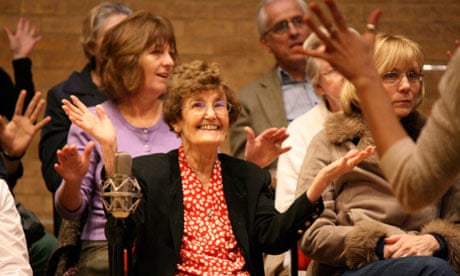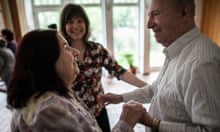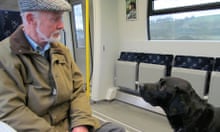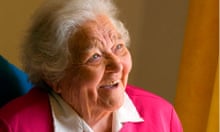Ruby is vivacious and animated, talking with conviction in perfectly modulated sentences, making statements and posing questions with bright, alert eyes and expressive gestures – yet none of it makes sense; random words float down the babbling stream that is her dementia. But sing an old song with Ruby, and the lyrics fall into place, all recalled, all cherished. She becomes her lively, coherent, younger self once more.
Ruby is one of 670,000 dementia sufferers in Britain today. A further 400,000 are thought to be suffering but are undiagnosed – a situation described as a "national crisis" by David Cameron, who has promised to more than double research funding to £66m by 2015. "Dementia is simply a terrible disease," he said. "And it is a scandal that we as a country haven't kept pace with. The level of diagnosis, understanding and awareness is shockingly low. It's as though we've been in collective denial."
There is a growing recognition that exposure to the arts can help dementia sufferers to reconnect with themselves and even slow their rate of decline. Increasingly, music is helping doctors and carers reach those who have become stranded by this debilitating condition.
Next week Turtle Song, a scheme run by English Touring Opera, will begin a unique songwriting project for those with dementia and their companions. It will be based at the Wardens Centre, near Aldeburgh, Suffolk, and run until early June, with professional musicians from the company guiding the participants through the process of creating and performing an entire song cycle. A similar scheme will take place at Clare College, Cambridge, in the autumn.
The charity Arts4Dementia announced last week that it had involved major London venues in a scheme to benefit those in the early stages of the disease. They can try drawing at the Wallace Collection and the National Portrait Gallery, or scriptwriting, drama, music, poetry and photography at Cadogan Hall, the Photographers' Gallery and the National Theatre.
But what about patients such as Ruby, whose dementia has developed to the extent that they need constant attention? The singer and pianist Eleanor Meynell is one of a growing number of professional musicians who are using their skills to connect with these patients. She will soon be appearing at New York's Carnegie Hall with Sir John Eliot Gardiner and the Monteverdi Choir, but when she is not on tour or teaching she goes into care homes with other musicians and attempts to help patients to reconnect with themselves.
"I left the BBC Singers four years ago and was working at the National Opera Studio when a colleague mentioned Lost Chord, a charity that sends musicians into more than 100 care homes around the country," she said. "My first exposure was sobering. There were people who appeared quite coherent alongside those who simply didn't respond. How do you make contact with someone who seems closed in on themselves? The extraordinary thing is that songs and lyrics elicit a response – a particular song might trigger a memory, a mood, a feeling. It might just be a raising of the head and a faint smile of recognition or there might be real animation and a sudden burst of song from someone who normally never speaks.
"Mary was once a pianist. Whenever I play at her home, her wheelchair is placed next to the piano and when I start to play, she responds, lifting her head in recognition. After a while, she will conduct me. Though she never speaks, we have made contact with each other. I met Ruby in another home and was immediately struck by her vivacity and engagement, even though nothing she said made sense. But as soon as we started to sing she was word perfect.
"Folk song is often a good place to start. You discover people with roots perhaps hundreds of miles away but they remember their local songs. Then we move on to popular numbers from films and shows and the golden age of song. Some of the more mobile patients will dance… and flirt. These songs remind them of their younger selves and the identity they had before they became unwell."
Numbers by George and Ira Gershwin, Jerome Kern, Cole Porter and Rodgers and Hammerstein are favourites. "This is wholesome music in all senses of the word; these songs are full of uplifting, therapeutic sentiments and simple joy. I've also noticed that patients respond to the structure of these songs, their repeats and choruses, their regular pulse."
These 60-minute sessions reveal previously hidden aspects of the patients to their carers; likes and dislikes, talents and memories – it all helps piece together the jigsaw of an identity obscured by illness. "Perhaps that patient reveals a love for a film or a place, a time or an event; something that carers didn't know about but can use in their communication with that patient, another way to connect with a seemingly closed personality. It's a glimpse of the real person underneath," said Meynell.
As Helena Muller, founder of Lost Chord, says: "Music unlocks that door behind which a frightened, intimidated and humiliated person hides."
Meynell applauds the work of Music for Life, a project run jointly by London's Wigmore Hall and the charity Dementia UK. Musicians, care home staff and managers meet after each session to reflect on what things they have learned about the patients – knowledge that helps in future care and treatment.
Robert Howard, Professor of Old Age Psychiatry and Psychopathology at the Institute of Psychiatry, King's College London, says that music, art and drama play an important role in the life of his unit at the Maudsley Hospital, London. "Conditions such as Alzheimer's affect the ability to make new memories and to decode language," he said. "Music is evocative to some patients and can reach down into their memory. Patients who normally struggle to find the right words can sing a song because a deep memory is triggered. It starts a tape running in their brain."
He agreed that arts projects helped him connect with patients and improved both their quality of life and the morale of staff. "There's no doubt that the arrival of charismatic musicians is an event for everybody involved," he said.
A remarkable video, which went viral last week, shows an elderly American man called Henry, who normally rarely speaks, revitalised and communicative when listening to an iPod loaded with his favourite music. When the headphones come off he gives coherent answers to questions about himself and his love for the music. Commenting on the video, the neurologist and author of Musicophilia, Dr Oliver Sacks, says: "In some sense Henry is restored to himself. He has remembered who he is and has reacquired his identity for a while through the power of music."
Meynell's work in care homes has given her a new respect for the golden age of song and inspired her and pianist Christopher Gould to establish Two's a Crowd, a singer-pianist duo that aims to breathe new life into the songs from the 1930s, 40s and 50s.
"The world is such a complicated and fractious place today. I sense that people are yearning for return to an age of innocence," she said. "These songs are so straightforward and uncynical – and they have rattling good tunes…"
Names of care home residents have been changed. For more information, visit lost-chord.org.uk and dementiauk.org
Watch Dr Peter Lovatt, psychologist and dancer, talk to TEDxObserver about how dancing can change the way we think




Comments (…)
Sign in or create your Guardian account to join the discussion